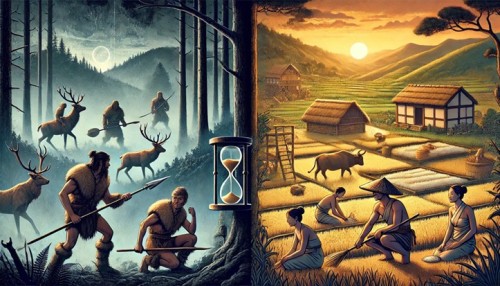Cultural Paradigms and Strategic Management
PEER REVIEWED PAPER
By Thomas Walenta
Hackenheim, Germany

Abstract
This essay explores how Western and Chinese cultural paradigms shape contrasting views of time, leadership, and strategy. Western societies, particularly the United States, tend toward short-term, individual-focused, linear approaches, while Chinese traditions emphasize long-term horizons, relational thinking, and cyclical perspectives rooted in agrarian practices. As François Jullien notes, Western notions of static “Being” contrast with the Chinese focus on dynamic “Living,” influencing how change and continuity are managed. This divide is mirrored in project versus program management: projects reflect efficiency, speed, and discrete outputs, whereas programs embody effectiveness, adaptability, and long-term coordination. Addressing forthcoming challenges will require a wide repertoire of viewpoints and methods, so integrating both perspectives into a pluralistic mindset is beneficial, as it supports balancing immediate action with long-term, systemic change.
Keywords: Paradigms, Program vs. Project Management, Chinese and Western culture, Hunter vs Farmer metaphor, Being vs Living, strategic management, pluralistic global mindset
Introduction
Understanding the underlying mental models for perceptions and decision-making helps in selecting the most appropriate one for the current situation. While the terms “project” and “program” are often used interchangeably, they reflect fundamentally different approaches to complexity, time, and value creation. These differences are also rooted in deeper cultural and civilizational paradigms.
A paradigm is understood in this essay to be a foundational set of assumptions, values, and mental models that shape how individuals, organizations, or societies interpret the world and make decisions (Kuhn, 1970; Schön, 1983). It acts as a cognitive framework—often invisible to those operating within it—that determines what is seen as true, normal, or possible (Lakoff & Johnson, 1980). Paradigms shape not only the way problems are framed but also the kinds of solutions that are seen as legitimate. In science, for instance, the transition from Newtonian mechanics to quantum physics marked a profound paradigm shift that transformed the understanding of reality itself (Kuhn, 1970). In culture, Western individualism and Eastern collectivism offer sharply contrasting paradigms that influence everyday behavior, leadership, and governance (Hofstede, 2001; Rosemont, 2025). Paradigms are powerful precisely because they guide thought and action so deeply that they often go unnoticed, until they are disrupted by contradictions, crises, or alternative perspectives (Morgan, 2006). Recognizing paradigms, including one’s own, is vital for working in complex environments, sparking innovation, and engaging constructively across cultural boundaries.
Western models often emphasize short-term gains, linear time (Chronos), and individual control, typically expressed through project-based execution. By contrast, Eastern perspectives, shaped by Confucianism, Daoism, and agrarian traditions, stress event-driven time (Kairos), long-term planning, harmony, and collective outcomes, aligning more with program-oriented approaches. This essay examines how ten paradigms of Western thought—including free markets, liberal democracy, and moral superiority—have influenced global governance and project practices, and how these are increasingly challenged by China’s rise and alternative worldviews. Fear and individualism reinforce Western short-termism, while the farmer metaphor, rooted in China’s agrarian heritage, underpins habits of patience, coordination, and ecological awareness.
Rather than being part of a formal philosophy, this agricultural legacy serves as a key reason why long-term, relational thinking has developed through societal evolution in some civilizations. Chinese approaches to governance, organization, strategy, and making change happen evolved out of this thinking and can be observed today. By examining the contrasts between Western and Chinese paradigms, the essay explores how different worldviews influence not only global politics and organizational strategy but also how we organize and implement change. Project and program managers, policy strategists, organizational leaders, and cross-cultural teams will gain valuable insights into how cultural paradigms affect decision-making, strategic alignment, and long-term value creation.
This essay builds on ten Western paradigms outlined in Saji Madapat’s forthcoming work The Gods Must Be Crazy II: A Rooseveltian Renaissance for Trump 2.0 American Renewal in the Chinese AI Century (Madapat, 2025). Madapat uses satire to critique the United States and call for a Rooseveltian revival of leadership, drawing on strategies once used by Theodore, Franklin D., and Eleanor Roosevelt to steer the nation through crises such as World War I, the Great Depression, and World War II. The analysis extends this debate by contrasting Western paradigms with Chinese perspectives, drawing also on François Jullien’s twenty pairs of concepts to highlight deeper civilizational differences. Later chapters examine Western anxieties and China’s agrarian heritage as cultural anchors shaping distinct outlooks. Taken together, these comparisons reveal how cultural assumptions influence not only governance and strategy but also the ways projects and programs are conceived: in the West as instruments of short-term control and execution, and in China as vehicles for long-term adaptation, coordination, and systemic balance.
More…
To read entire paper, click here
How to cite this paper: Walenta, T. (2025). From Hunters to Farmers: Cultural Paradigms and Strategic Management; PM World Journal, Vol. XIV, Issue X, October. Available online at https://pmworldlibrary.net/wp-content/uploads/2025/10/pmwj157-Oct2025-Walenta-from-Hunters-to-Farmers-cultural-paradigms-and-strategic-management.pdf
About the Author

Thomas Walenta, PMP, PgMP
PMI Fellow
Hackenheim, Germany
![]()
Thomas Walenta brings more than 50 years of experience in projects, including over three decades in leadership and two decades in program management. He delivered his first project in 1974 and went on to spend much of his career at IBM, where from the mid-1990s he built PMOs, led complex programs, and successfully turned around troubled initiatives. His work included major SAP rollouts, outsourcing contracts, and portfolio integration across industries and regions. More recently, he supported a German manufacturer in introducing enterprise-wide portfolio management and a hybrid PMO. Over the years, his assignments have taken him through government, banking, insurance, electronics, and automotive sectors, and his professional journey has spanned Europe, Russia, the U.S., Japan, India, and nearly 100 countries worldwide.
Since 1998, Thomas has been an active volunteer with the Project Management Institute (PMI). He served as President of the PMI Frankfurt Chapter, completed two terms on PMI’s global Board of Directors, and spent five years on PMI’s Ethics Review Committee. In 2012, he received the PMI Fellow Award, awarded to fewer than 100 individuals worldwide. He has held the PMP since 1998 and the PgMP since 2014. He continues to volunteer for global PMI groups and works as an event manager for the local Chapter.
Thomas has led his own consulting business since 2001, taught project management at two universities for over 20 years and spoken at more than 100 international conferences. He has published extensively on project and program management, earned a diploma as a non-executive director from the UK’s Institute of Directors in 2017, and has been pursuing a DBA at SBS in Zurich since 2023. He also mentors around 15 professionals, apprentices, and refugees. Thomas lives in Hackenheim, near Frankfurt, Germany, and can be reached at thwalenta@online.de.









